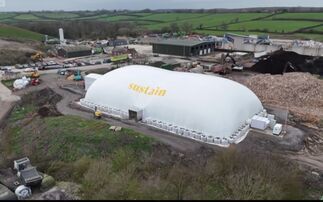Tech giant's chief environmental officer talks to BusinessGreen about the firm's ambitious plan to remove all CO2 it has generated since its foundation in 1975
"One of the biggest takeaways I'd have for anyone right now is not to take your foot off the gas," says Lucas Joppa, Microsoft's chief environmental officer, as he ponders the impacts of the coronavirus crisis on delivering corporate climate goals. "Actually, I guess that's an unfortunate analogy. Now is the time to take your foot off the gas. But now is not the time to take your foot off the accelerator on sustainability ambitions."
And Microsoft certainly does not appear to be taking its foot off the green accelerator. Even before Covid-19, 2020 was already a big year for the tech giant and its environment lead, who spoke to BusinessGreen from his home office in mid-April as coronavirus shutdowns snowballed across North America and Europe. Microsoft hit headlines at the start of year with a hugely ambitious plan to be 'carbon negative' by 2030, backed by a pledge to - by mid-century - retroactively remove all carbon dioxide the company has ever emitted since it was founded in 1975, in an announcement that sent shockwaves across the corporate world.
Microsoft's climate "moonshot" - which trumped the net zero pledges from growing numbers of its competitors - earned praise from environmentalists and investors alike. Company shares jumped two per cent in the wake of the announcement to hit a record high in February, and influential CNBC financial analyst Jim Cramer mulled a "shocking paradigm shift" where capitalism was increasingly trying to "regulate itself" despite a climate policy vacuum at a national level in the US.
And just four months later, as the coronavirus ripped through economies, public health systems and annual earnings forecasts, Microsoft further upped its sustainability stakes, outlining plans to build a 'planetary computer' as part of a raft of new measures geared towards protecting biodiversity. The wildlife-borne pandemic was testament to the need to protect the delicate balance between humans and planet, Microsoft said, and it was time to bolster its headline-grabbing carbon reduction programme with other climate priorities.
The firm's already-bulging file of sustainability commitments is only set to grow as the year progresses, according to Joppa. The company intends to unveil its strategy in quarterly chunks throughout 2020, focusing on one issue each quarter. So, with biodiversity and carbon completed, plans for water and waste are on their way next.
"One of the big lessons that we're trying to learn and implement internally is that these things are all part and parcel of the same problem - that's why my title is chief environmental officer," he explained. "But at the same time, the way I structure my annual rhythm of business allows me to take bite-sized chunks of the most existential problem our species has ever faced, and to try to make meaningful action in each, all wrapped up in the broader context of humanity's relationship with the rest of the natural world."
Such lofty visions do not come cheap. Microsoft has said it will invest $1bn in exploring and accelerating the development of carbon removal technologies over the next four years. Its internal carbon tax - levied on internal business transactions since 2012 and which is set to be extended this summer to suppliers and customers - is set to help bolster other sustainability measures, too.
The fee and the fund are complimentary, Joppa explains: "The fund is basically out there investing and trying to reduce the cost and increase the scalability of new technology. And then as Microsoft goes through the years, the fee that we leverage internally will procure those sorts of solutions."
While Microsoft landed on its bite-size approach to sustainability in early 2019, spending the second half of the year getting buy-in from the executives and different business units, work started more than a decade ago, according to Joppa. The company has been counting carbon since 2012, when the internal carbon fee was introduced, allowing the firm to claim carbon neutrality. Currently set at $15 per metric ton, it has financed a number of renewable power, carbon offsetting and energy efficiency projects, including a trial of ultra-efficient data centres on the ocean floor.
Moreover, the firm has been invested in environmental research from a product and innovation perspective for more than a decade. Joppa's career is testament to that commitment; he joined Microsoft Research - the firm's emerging technology centre - in Cambridge in the UK fresh from finishing his PhD in ecology back in 2009, having been hired to explore the intersection between the company's business priorities and the world's environmental priorities. "My task then was to be thinking 30 to 50 years out about the needs of the world from an environmental perspective, and the computing needs of the world from an environmental perspective," he says. That research led to the launch of a $50m AI for Earth grant programme for conservation research in 2017, which in turn inspired the recently announced planetary computer.
The first "significant milestone" to watch for over the coming years, he says, is the firm's complete divestment from fossil fuel-generated power, set for 2025. That goal has been supported by a clean energy purchasing spree of late; BloombergNEF data shows that in 2019, Microsoft inked some 800MW of renewable power purchase agreements, making it the fourth-largest corporate purchaser of clean energy worldwide, after Google, Facebook and Amazon.
But clean energy can only offset a fraction of the firm's footprint. Of the 16 million metric tons of carbon Microsoft expects to emit in 2020, just four million are from power. Three quarters are supply chain emissions, including from building materials, business travel, and in the full life cycle of its products, such as from the electricity customers require to power Microsoft goods and services.
But unlike one of its top US tech and computing competitors Amazon - which has faced growing pressure from customers and employees alike to step up its climate commitments - Microsoft includes its wider supply chain emissions in its carbon accounting, also known as Scope 3 emissions. Joppa argues that, while mitigating supply chain emissions is an onerous and frustrating task, the management and reduction of Scope 3 is where forward-thinking companies can stand out. "A lot of people ask - I ask it myself all the time - why is this our problem? But that's the unhelpful way to look at it," he says. "I think the more helpful way is ‘where's my biggest opportunity to help lead the world where it needs to go?' [Scope 3] is the leverage. That's the lever that we have to pull - so we should go and pull it."
The company's Scope 3 strategy includes a plan to forge partnerships that help its customers reduce carbon consumption, to provide customers with carbon performance insights on its Azure platform, and to drive cross-industry collaborations to develop new standards and tools. Customers and partners will also be incentivised to reduce their emissions by the carbon levy that comes into force in July, which will start at a lower price than the internal fee, but gradually scale up.
Ultimately, however, Microsoft must suck large quantities of carbon from the air to counter huge amounts of historic and Scope 3 emissions, hence its decision to become a major investor in the nascent carbon removal technology sector. Its $1bn Climate Innovation Fund will be spent specifically on project finance and providing equity and debt capital to organisations developing and researching carbon removal, capture and reduction technologies. While no partners have been revealed yet, commentators have noted that company co-founder Bill Gates was an early-stage investor in Canadian direct air capture start-up Carbon Engineering.
"We really do need to mature those markets, because market availability is orders of magnitude below potential," Joppa says. In the meantime, however, Microsoft will invest in nature-based decarbonisation solutions like afforestation and tree planting, through its carbon fee "because that's what's on the market today at an effective cost point", he adds.
While Microsoft's sweeping vision has been largely commended by environmentalists - the Environmental Defense Fund dubbed it a "hat trick of sustainability leadership" - it has been met with criticism in some quarters, with green groups pointing to the firm's cloud service and artificial intelligence contracts with ExxonMobil and Chevron, and the inauguration of an AI Centre For Excellence serving oil companies in the United Arab Emirates in January.
Joppa counters that ostracising the fossil fuel industry from the energy transition would be counterproductive. "We are not going to fundamentally change the game or achieve societal transition through disengaging in conversations, and completely disengaging in collaborations with the sector that is going to be the most affected," he argues. "It's really hard to be a leader if no one is willing to follow you. Some of the hard-line tactics that people espouse are great from a virtue-signalling perspective but they don't get the job done."
In his view, similar tactics have stymied the progress of carbon removal technology, squandering precious time in reaching global climate goals. For more than a decade, he stresses, a "significant constituency" of the environmental sector dismissed talk of carbon removal technology. "They said it represented some sort of moral hazard, and shut down any attempts to engage in that space," he adds. "Then the IPCC 1.5 report [in 2018] started ringing the alarm bell as loudly as possible, saying there's no model that shows us meeting our climate goals without overshooting, and that we have to do removal as well. And so now, the world is scrambling trying to invest in removal technology, and where did disengagement get us? It's got us to the exact same knowledge that we had 10 years ago, but we're further behind."
Some of the technologies Microsoft has elected to explore through its fund remain contentious. Some 600 environmental groups, including Greenpeace and 350.org warned US lawmakers in January 2019 that they "vigorously oppose" carbon capture and storage, a process that traps excess carbon pollution in the earth. Many other major groups, however, including the Sierra Club, the Natural Resources Defense Council, and the Environmental Defense Fund were notably absent from that campaign.
But the world has been turned on its head since Microsoft's groundbreaking carbon negative announcement in January, and how things play out for the global economy in the wake of the coronavirus crisis remains to be seen. Looking to the future, Joppa believes the economic disruption caused by Covid-19 has served up "a huge lesson" to the world. "We have learned the flipside of that one-to-one correlation between economic growth and environmental degradation," he says. "It's a correlation we need to break."
For Microsoft, artificial intelligence - one of its key business offerings - opens up huge opportunities to divorce environmental destruction from economic growth, particuarly in the wake of Covid-19. Research published by the firm in 2019 with consultancy giant PwC claimed that the adoption of AI in just four sectors - water, agriculture, energy and transport - could boost global GDP by 4.4 per cent while reducing greenhouse gas emissions by as much as four per cent.
Amid huge disruption wrought by the impending coronavirus-driven recession, businesses now face a "fork in the road", according to Joppa. "The question is, are we going to come out of this and go 40 years backwards, just to accelerate things and to kick start the economy?" he wonders. "Or are we going to start building a future that looks towards increasing growth - which is what we want - but decreasing environmental impact?"
Yet for all the current wider economic uncertainty, for Joppa the choice of direction is a clear one, and Microsoft's determination to follow through with what is one of the most ambitious and far-reaching corporate decarbonisation plans announced to date remains undimmed. With the right government stimulus coming out of the current crisis, he argues, the world now has "a real opportunity" to follow a net zero - or even carbon negative - pathway.
The Net Zero Leadership Hub is brought to you in partnership with BT, as part of its support for the Net Zero Leadership Stream at the world's first Net Zero Festival this autumn. All the content on the Hub is fully editorially independent unless otherwise stated.
You can find out more about the Net Zero Festival and reserve your place here.









